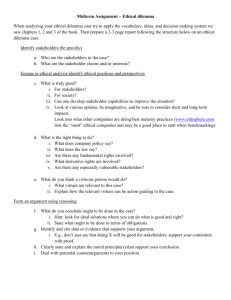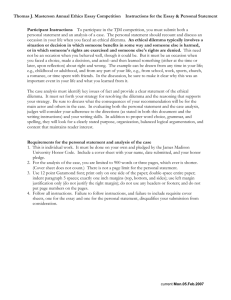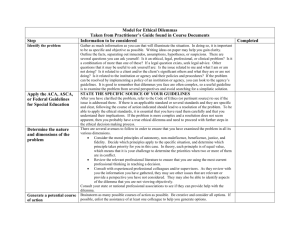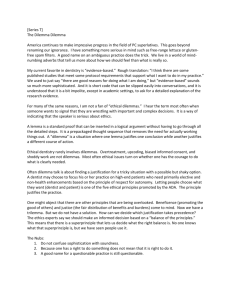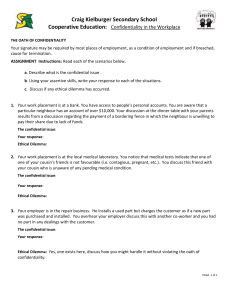Work_Sample_Ethical_Problem_Solving
advertisement
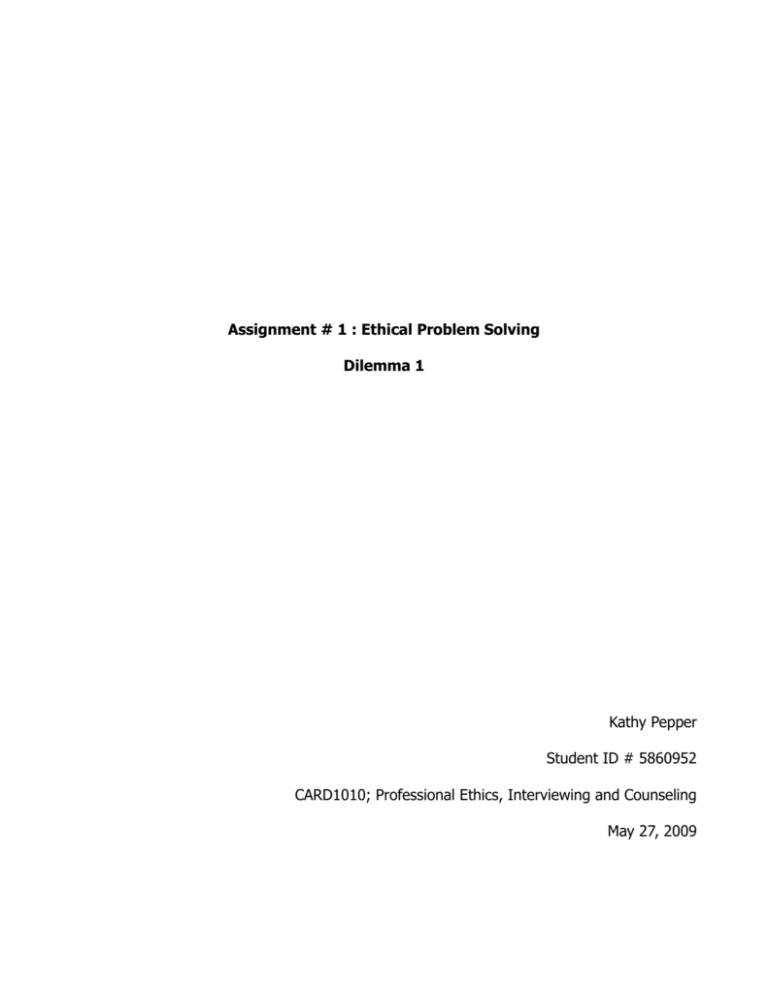
Assignment # 1 : Ethical Problem Solving Dilemma 1 Kathy Pepper Student ID # 5860952 CARD1010; Professional Ethics, Interviewing and Counseling May 27, 2009 Kathy Pepper May 27, 2009 Student ID # 5860952 Page 1 Dilemma 1 You are working on a summer contract in a youth employment-counseling center. The company has a reputation for doing good work and has some of the local leaders in the field of employment are involved as counseling staff. Through the internal grapevine, you learn that the financial situation of the center is not stable because they have lost some of their major funding due to government cutbacks. The center uses “employment” as their only criteria to measure their success. You have been assigned to a project that is focused on youth with multiple barriers to employment, such as drug and alcohol problems, truancy and no history of solid gainful employment. Each client is expected to attend 6 sessions of 3 hours each. To stay in the program, they cannot miss any sessions. There are no exceptions. As you start working with the youth group, you note several absences. If you report all the absences in an honest fashion, the center will likely lose funding and the clients will not get the support they need to deal with the very problems that are hindering them from becoming employed. Working through the ethical dilemma worksheet, what is your resolution? Kathy Pepper May 27, 2009 Student ID # 5860952 Page 2 1.The ethical standard or principle involved. Canadian Standards and Guidelines for Career Development Practitioners, Code of Ethics, 2004, reference 2 (a): “Integrity, honesty, objectivity”. Canadian Standards & Guidelines For Career Development Practitioners; Areas of Specialization, Career Counselling, 2004: under “Establish and maintain a collaborative relationship with clients”:, sub points (a) through (e), particularly counselor demonstrating professional attributes (reference C1.1.2) and communication skills (reference C2.2); maintaining collaborative work relationships (reference C2.2.6); client focused regarding client expectations, needs and goals and providing information to clients on all service options available. An “internal grapevine” could indicate possible lack of effective communication channels and client focused planning, regarding meeting client needs / goals and providing information to clients. To stay in the program – following agency program “rules”. Minors – check implications. Legal issue – potential – due to governmental funding provisions if tied to specified reporting on attendance; even if not, implication to center and funding due to unethical behavior; sanctions (personally, professionally, center, and the larger profession in terms of credibility) 1.Ethical trap possibilities. The “commonsense, objectivity trap” (The Ethical Decision-Making Manual For Helping Professionals, Steinman, Richardson, McEnroe, 1998 Brooks/Cole, Cengage Learning. pp 3-5) Kathy Pepper Student ID # 5860952 May 27, 2009 Page 3 could apply in terms of the counselor's / other world views – as in participation in grapevine as acceptable. The“circumstantiality trap” (Ibid. pp 7-9) may be a consideration, with perceived loss of funding possibility “justifying” dishonest reporting, as well applied to the assumption “clients will not get the support they need”. The “who will benefit trap” (ibid. pp 9-10) may apply also in this assumption, as well as in the question of dishonest reporting where the counselor may feel this is putting client needs first, whereas in fact it does not meet short or the more important long term interests of the client. In looking at “the ethical hierarchy” (ibid. pp 10-11), dishonest reporting would contradict “refrain from any behavior that would jeopardize their ability to work in their professional field”, as well as “when professionals have an ethical choice to make, they should ensure that in doing so they do not put themselves in a position that might limit or eliminate their value as professionals to others” (ibid). Dishonest reporting would not satisfy current or future client needs, nor this professional or other professionals, and possibly adversely affect helping services and funding considerations. The comments in the dilemma statement regarding the center's “reputation for doing good work” and the reference to local leaders in the employment field being involved in counseling, dishonest reporting could / should adversely affect both circumstances. it also raises concern about the validity of these statements if indeed there is an internal acceptability of dishonest reporting (versus understanding and application of appropriate code of ethics), and poor communication, for example with the internal grapevine as source (versus open communication and client focus). Kathy Pepper Student ID # 5860952 May 27, 2009 Page 4 3.Preliminary Response Consult with supervisor and ask about what you heard in terms of the financial picture and discuss openly your perceived dilemma about reporting the absences. If your supervisor says the information in the grapevine is incorrect, ask for relevant information on the center (that may not have been covered in recruitment / orientation), discuss with supervisor how communication channels can best work so you can meet all stakeholders interests. Be ready to offer suggestions. Be very open about your perceived dilemma around reporting so you can address that ethically and professionally. Discuss the effectiveness of the program you are leading, the client profile and the success criteria, be ready to make suggestions and to be available to participate in any further dialogue. Discuss what happens next now and after your contract to the clients / program. If on discussing the rumor with your supervisor, your supervisor indicates that it is true, all of the above would apply I believe, plus the need perhaps for legal support. If funding is contingent on specifics of the program including mandatory attendance, the scope of the past problem and the implications for the future need addressing. Without minimizing addressing that very important piece, is it possible to propose and validate a program change to better meet client and stakeholder best interests which would modify the attendance requirement, perhaps adding different components to support the client profile / needs, and lastly reviewing success criteria for center programs? If the rumor is correct, it is important to appropriately inform affected clients and begin to provide for effective information exchange, referrals and follow up. Kathy Pepper Student ID # 5860952 May 27, 2009 Page 5 If on discussing the rumor with your supervisor, your supervisor indicates it is true and attendance is a requirement under the funding arrangement, and you are to ignore absences (although this would appear to contradict the dilemma information regarding “no exceptions”), then a discussion with a trusted experienced colleague is suggested and connection with the ethical body for the field is required. Taking care of your clients for continued care is then important as well as the need to resign the position due to the ethical standing as well as addressing your own ethical position as you debated this issue. 4. Possible consequences of adopting this response. Where the rumor is incorrect, the existence of a grapevine discussion of this topic as an example, in an organization which is known for “good work” and with “leading” employment sector counselors may indicate an ethics and communications issue. The consequences of addressing these issues openly may bring short and long term discomfort to the organization and its members. It may also bring renewal and refocus, with an opportunity to review and reaffirm ethical expectations, create better communication channels, undertake program effectiveness reviews and examine center measures of program success which could perhaps better support funding applications while reflecting more accurate measures of client needs being met and goals supported. The consequences of not addressing the issue if the rumor is incorrect, is possibly perpetuating poor communication channels (“internal grapevine”) and misinformation (as in the circumstances of the dilemma), which may affect center performance in being able to meet client needs and professional obligations and losing what the dilemma suggests as a point of pride, a center that “does good work”. Kathy Pepper Student ID # 5860952 May 27, 2009 Page 6 Where the rumor is correct, all of the above. An additional consequence is a needed review on attendance reporting in terms of its relevance to government funding. Legal support is important. Another consequence are sanctions. Most important, the consequences to the clients, who from the dilemma's client profile information, may view the center's behavior contradicting their needs / goals, creating a trust issue that needs to be rebuilt with better programs in the long term; in the short term, their best interests have been compromised and a consequence may be a problem in finding alternate support that can meet their needs (I am thinking of where government funds have been allocated to this center versus another). 5. Ethical Resolution I would follow the preliminary response. My personal thoughts on this resolution is that I am satisfied with it. I struggled through it. As I am new to the field I am looking forward to feedback to see other ways I may have addressed this. In the new counselor raising the concern, there may be an opportunity for positive change. However, the new counselor still had a personal dilemma in what to do, signaling likely activation of the “traps” and a need to revisit the profession's ethical base.

